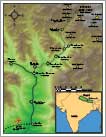
Climb Mt. Everest FAQ
One on One with Wally Berg – Can I climb Everest?
What does it take to climb Everest? Four-time Everest summitter Wally Berg sits down for a one-on-one advice session.
- How much experience do I need to climb Everest?
- What's a good "first step" for the prospective Everest climber?
- What will be my main concerns once I arrive in the Khumbu?
- Is it true that Everest is only for "type A" or highly driven, success-oriented people?
- Any final thoughts or words of wisdom?
 1. How much experience do I need to climb Everest?
1. How much experience do I need to climb Everest? 
- Everest is possible for just about anyone with the right level of commitment, respect for the mountains and mountaineering, and time to learn. Everest is not something that you are going to do in only two months, even though that's the amount of time you'll spend away from home the season you decide to do it. It's something that will take a huge commitment in your life, support from your family and friends, adjustments in work and lifestyle schedules.
- What people who are beginning to dream about Everest should ask themselves is, "How high have I climbed? What experiences have I had with altitude?" Begin by asking yourself, "Where in the world can I go to 19,000 or 20,000 feet and see how I do?" Kilimanjaro is a good place to find out how you feel. Aconcagua and Ojos del Salado are also good.
- My feeling is that the South Col route on Everest is a very reasonable route to try to go to 8000m on for the first time – there's more support and the route is better controlled and organized than on the other 8000m peaks.
- But you wouldn't want to go until you had shown yourself that you enjoy travelling and living in the Third World for an extended length of time. That's something that a lot of people don't think about. Go to a wild mountain area in the Third World someplace – Nepal would be perfect or trekking and climbing in the Andes. Find out how your body does on the other side of the world with new food and new people, away from your familiar world.
- 2. What's a good "first step" for the prospective Everest climber?

- Go trekking in Nepal. Just walking to Base Camp is a challenge because of the altitude and being in the shadow of Everest to gives you a feel for the culture and the people and to see how you would live there.
- Of course, the more climbing experience the better. Altitude is the biggest factor on Everest but you wear crampons every step of the way above base camp and basic ice axe skills and familiarity at moving across moderate glacier terrain and alpine ice climbing are essential.
- Another great "first step" for the serious prospective Everest climber would be our Western Cwm expedition, where you really get a taste of what Everest is all about and what it's like to be on the mountain as part of an expedition team.
- 3. What will be my main concerns once I arrive in the Khumbu?

- The Everest expeditions are very well organized and they allow for flexibility and a strategy that the leader of the expedition – someone like myself – will put in place with the team members. That's part of the advantage of going on a team like ours. A properly organized team allows you to focus on your own physical efforts and cooperation with your teammates – supporting them and giving them good spirit. You are not compelled to scratch your head or do calculations about when loads are moved on the mountain, which food goes where, where the oxygen bottles are, what days the Sherpas are moving camps, what the religious and spiritual calendars of the Sherpa are telling them about days, etc.
- 4. Is it true that Everest is only for "type A" or highly driven, success-oriented people?

- All different kinds of people have success on Everest, which just shows it's reachable for virtually anybody who puts their head to it. You certainly need to be driven, but success on Everest requires a level of patience that's often a challenge for people who are used to having a lot of success in their lives. If I've seen a personality type that is likely to do better on Everest it's probably someone who has met with some disappointments and setbacks in their life but has a character to continue rather than someone who has been conditioned to make things happen fast and always be successful.
- 5. Any final thoughts or words of wisdom?

- People who climb with me on Everest, if they are going to be successful, need to accept that mountaineering is going to get in their blood. They need to savour and enjoy the climbing that they do in preparation for Everest. Everyone who has stood on the summit of Everest has thought soon about a climb they want to do elsewhere. I don't believe that Everest is a good goal for someone who wants to climb just one mountain, Everest. I don't even believe it's a good goal for someone who wants to climb five or six or seven mountains, culminating in Everest. I think you need to ask yourself whether mountaineering and hill walking and climbing are activities you enjoy. If they are, you can probably stand on the highest mountain in the world. If not, I don't think it's a good goal for you.


